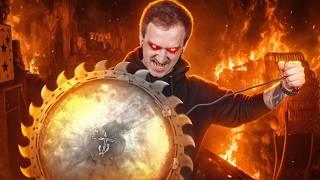
The TOP SECRET story of why you say this word the way you do!
Комментарии:

Brilliant HI [Human Intelligence] ✨
Ответить
So next up: burnt is pronounced as burnèd? 😁 or burned as burnèd to confuse people.
When I saw the title I immediately knew the subject. As a foreigner (Dutch) the pronunciation of covert had always baffled me. And when I was in university many students pronounced it ‘wrong’ and were corrected by our professors.

While researching something else, I stumbled on a letter to the editor from 1901 (The Russell (Kansas) Record, 19 Jan 1901, p. 7), in which some pedant attended a teachers' convention and listed every grammatical and pronunciation error they heard. One of them was someone pronouncing the first syllable of "covert" as "cove." So at least one person was saying it that way in 1901.
The "errors" in the list are mostly split infinitives and singular "they" and the like. Other pronunciation "errors" were rhyming "leisure" with "pleasure" (Webster has always accepted both pronunciations), and rhyming "sacrifice" with "nice" (I'm not sure how else "sacrifice" could be pronounced. Ending with -ees?)

Okay. Why do I say Monroein Monroe Doctrine like monster?
Ответить
It makes me deliberately want to go back to the original pronunciation. In fact I will.
Ответить
This is a great video. Not having really thought about it, I just thought the word was a heteronym.
I can't say I have paid attention to the usage of the pronunciations (or spellings it would seem) until now and always thought "covert" with the original pronunciation was the same word at "Covet." Perhaps it is a case of personally not having heard the original pronunciation used or, if I have, not paying enough attention to what was said and assuming "Covet."
Between "covert", "covered", and "covet", perhaps the more modern pronunciation is useful. It would help with the phrase "to covertly covet a covered cover."

The Tenth Commandment allegedly states 'Thou shalt not covet' - this puts a rather sinister spin on the cold war, spy rings and secrecy act.
Ответить
This sort of feels like the instance of, "I read this word but never heard anyone pronounce it before beginning to use it in daily speech."
Ответить
Geoff is looking a bit like George Smiley.
Ответить
The old pronunciation works as a noun but sounds bizarre as an adjective
Ответить
does anyone else see that the modern overt/covert opposite pairing, particularly as descriptors of government actions, rules out the possibility of “open” as in transparent? whether we describe an operation as overt or covert, in neither case do we mean truthful. “overtly, they offered medical aid, but covertly, they were providing military training”. so neither are “open”.
Ответить
This is suuuuch a good video omg
Ответить
Cover-t
Ответить
No, declassified means 'it used to be classified but is not now.'. 'Unclassified' means 'not classified'.
Ответить
I wonder if there is any relation to the swedish word ”kuvert” meaning envelope.
Ответить
Thanks! Yes, please make a video about stress shift!
Ответить
I’m digging the the music video vibe.
Ответить
Covert is the learnt of covered? Oh my.
Ответить
Fascinating. It stands out to me that in several of the presidential office tapes, the speakers pause before the word "covert," almost as if considering on how to say it, before landing on the new pronunciation.
Ответить
Dr Geoff Lindsey has legs! Who knew.
Ответить
That is odd, as it seems like a variation of the word covered
Ответить
Lol that certainly is one of Shakespeare's least pronounceable lines.
Ответить
"covert mean" not "covet means"
finally makes sense....

Its interesting that we now say covert as "cOhw-vert", but covet is still "cuvet". (If that makes any sense!) I noticed, during the pandemic, most people said COVID as "cOhw-vid but some said Covid like they would Coventry.
Ответить
If covert were the prefix "co" with the suffix "vert", it would be fitting. The root word of covert would itself be covert.
Ответить
We actually watched that JFK speech, unsubtitled, in school. I heard it as "covered" and until this very moment forgot it entirely, putting it down to the unusual accent JFK brings to every word. I wonder how many other times I've heard the older pronunciation and simply written it off as a strange pronunciation of "covered" before forgetting it entirely...
Ответить
Now here's a thing. My mother said CUVert, right up until her death a year back at 100. My father said COvert - I don't think he said co-VERT. Both were in British Intelligence in the war, and my father for a short time after.
I say CO-vert, which is why I noticed my mother pronouncing it differently. But at the time, she made a connection with French. The word is from Old French Covrir. Modern French uses the adjective couvert (or couverte m) which is pronounced coo-Vere. The coo is almost co as in so. French as a language and the French intelligence services were both very much mixed up in the cold war of course, so I could see a possible French influence in the change of pronunciation and even on the stress shift to the second syllable.
My 1999 OED (full) only lists the one pronunciation, ˈkʌvət. But my modern Shorter OED lists three, with ˈkʌvət as the first.

What a well-researched and well-produced video, if a bit long
Ответить
I looked at the Read Lexicon, the principal community-made dictionary for the Shavian alphabet. The noun sense was pronounced/spelt “CUV-ərt”, while the adjective sense was pronounced “co-VERT”.
Ответить
Co-vert and cover't can now be seperate words, co'vert being the one mostly in use, but the earlier pronunciation we can use to bring back the old non spy associated usages.
Ответить
😊 I really enjoy your videos, thanks. 🎶 (I also enjoyed the music at the beginning.) I have learned most of my words through reading, documentaries, and Sci-Fi. But I still enjoy poetry and old stories. So although I have heard the new pronunciation for years, I rather like the old word.
Ответить
without context I thought I heard convert instead of covert at first
Ответить
I don't want a video on stress shift because I may be forced to respect people who say "bell PEPPer" instead of "BELL pepper"
Ответить
Somehow I can't hear the change in the second vowel. But then I'm from the US south. We only have like four vowels, everything else gets Schwaed
Ответить
You changed the thumbnail
Ответить
tldw: it was covErt, and now became cOvert, because CIA
Ответить
Id say the old pronounciation is there because you do still say it, i wouldnt say it if i was on a "covert operation" but i would say it in the old way if i was "keeping it coverted"
Ответить
I pronounce it khvrrtt. Kind of squealing, like an ant.
Ответить
"Don't poke fun of people who mispronounce words; it means they are well read, and learned the word in a book rather than in conversation." Thus a word that had been in decline saw a revival in print, and then in people who only saw it in print and drew their own conclusion as to how it should be pronounced.
Ответить
The boys at the end were pretty cute. I'm glad you're popular even among kids over there!
Ответить
Genuinely thought I was looking at an ad when the video started, and tried to skip it before you started talking. The fact that I have no idea what you might have been selling but that it was still so ad-coded concerns me.
Ответить
Yes do please do one about stress. I watched a documentary the other day with the line "the coach even had a chocolate VENDING machine" which to my ear instantly evoked a machine made of chocolate, as opposed to a CHOCOLATE vending machine. Note that Roald Dahl's book is called Charlie and the CHOCOLATE factory, not Charlie and the chocolate FACTORY. In the same way, a brick FACTORY can make clothes, while a BRICK factory makes bricks although it can be built out of concrete.
Ответить
I'm surprised it was ever pronounced the old way, because that's not how it should be pronounced given the spelling. The current modern pronunciation is correct. Although I suppose there are plenty of words that are pronounced incorrectly based on their spelling, such as color (the British spelling of colour would be pronounced even worse).
Ответить
Actually, I have said "cover-t" for a long time since I understood that the "new" pronunciation was due to its use on television, especially news programs. Recordings of news programs before, maybe, 1970, use the older, and to me preferred, sound. "Covert" and "overt" were never a pair.
Ответить
Technically, those are IEMs (in-ear monitors), but that's being super pedantic and isn't really a distinction you hear outside hardcore audiophile contexts.
Ответить
Where is that Fox Inn? Asking for a friend who is definitely not a fox.
Ответить
this is yet another example of aluminum, American just pronounce it differently than Brits. dont try to read to much into it
Ответить
Hi from America (Oregon). I learned about the pronunciation of this word in biology class. In the late 1970s, I learned that the feathers covering a bird's wings and tail were called coverts, with the old pronunciation. Today (2025) I sometimes hear it pronounced CO-verts, stress on the first syllable and with long O, but mostly still the old way. It was never pronounced co-VERTS.
Ответить

























